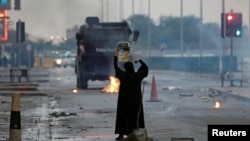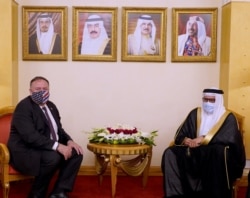The U.S. State Department this week designated as a terrorist organization a Bahrain-based Shi’ite militant group known as Saraya al-Mukhtar (SM) for allegedly receiving “financial and logistic” assistance from the Iranian military to oust the small island Arab nation’s government.
“Saraya al-Mukhtar is an Iran-backed terrorist organization based in Bahrain, reportedly receiving financial and logistic support from Iran’s Islamic Revolutionary Guard Corps,” said Secretary of State Mike Pompeo in a statement Tuesday.
Pompeo added that the group’s “self-described goal is to depose the Bahraini government with the intention of paving the way for Iran to exert greater influence in Bahrain. The group has plotted attacks against U.S. personnel in Bahrain and has offered cash rewards for the assassination of Bahraini officials.”
Bahraini authorities welcomed Washington’s designation, though it comes much later than similar moves taken by other countries, including Britain, where the Parliament blacklisted the group in 2018. Saudi Arabia, the UAE and Egypt designated the group on the same day as Bahrain a year earlier.
“The designation is a significant positive step taken to confront the malicious actions and intentions of the terrorist organization supported by the Iranian Revolutionary Guards, and to combat its destabilizing activities in the region and dry up its sources of funding,” Bahrain’s Ministry of Foreign Affairs said in a statement.
What is Saraya al-Mukhtar?
The obscure group, whose top leadership remains unknown, also is referred to as the Bahraini Islamic Resistance. It was founded in 2013, two years after the Sunni rulers of the kingdom, with Saudi Arabia’s military support, violently crushed a popular pro-democracy uprising led by the nation’s majority Shi’ite population.
Nearly 70% of Bahrainis are Shi’ite, who have been ruled by the Khalifa family since the late 18th century. Rights groups have accused the Khalifa family of employing repressive tactics against the religious group to maintain their grip on power, often using Iran’s support for militant groups as justification.
“While Iran’s support for such activities has been documented widely,” said the United States Commission on International Religious Freedom, a bipartisan government body, in a report Thursday, “the Bahraini government has sometimes used this pretext to crack down on Shi’a opposition leaders, clerics, and activists, without consistently substantiating charges of subversion or terrorist activity.”
Though SM has not pulled off any deadly attacks in years, it had, in the past, claimed responsibility for low-key attacks involving improvised explosive devices (IEDs) and shootings against the country’s security forces. Analysts accuse Bahrain of recruiting foreign nationals to serve as security personnel, while restricting armed and police service for the Shi’ite community.
To end Bahrain’s discriminatory practices, analysts say SM has viewed violence as the solution. Armed struggle is prominently featured in the group’s logo, which shows two guns placed atop a green fist: a black zulfiqar sword and an AK-47.
“With Saray al-Mukhtar, some of the attacks that they pulled off, sometimes they were initially just small arms attacks,” said Phillip Smyth, an analyst on Shi’ite Islamist militarism at the Washington Institute for Near East Policy. “They were using improvised weapons, then it started to move up to IEDs, different low level IEDs, and a lot of these would target Bahraini security personnel.”
According to the State Department’s annual terrorism reports, no deadly terror attacks have taken place in Bahrain since 2017. That year, the State Department accused Bahrain’s Shi’ite militants in general of remaining “a threat to security forces and attacks in 2017 resulted in the death of four police officers.”
Revenge for Soleimani
While unlike other Iran proxy groups such as Iraq’s Kataib Hezbollah, Saraya al-Mukhtar has not attacked U.S. interests, it has made threats against Bahrain’s key international backers, namely Washington and Riyadh.
The most explicit one came following the January U.S. drone strike that killed Iran’s powerful general, Qassem Soleimani, in Baghdad.
“We must respond firmly to this crime and be one of the first to respond to tyrants, led by the American arrogant,” read a statement, signed by Saraya al-Mukhtar and several other groups, including most notably Saraya al-Ashtar, another radical Shi’ite group designated by the U.S. in 2018. “We consider all its interests and presence in Bahrain to be legitimate targets for us.”
In September, Bahraini authorities reportedly foiled a terrorist attack against foreign diplomats based in the country after the security forces found alleged explosive devices on the street.
Bahrain accused Iran of being behind the attack, which analysts interpreted as a potential attempt to avenge Soleimani’s death. Last month, Bahrain convicted 51 individuals on charges of committing “terrorist acts” based on “directives received from the Iranian Revolutionary Guards’ leaders abroad who take Iran and Iraq as sanctuaries.”
Some analysts say the recent U.S. terrorist designation of Saraya al-Mukhtar gives political support by Washington to Bahrain, particularly after the Arab country normalized relations with Israel.
“The designation of this dissident group by the U.S. government could also be translated as a sign of gratitude and expressing gratification of [U.S. President Donald] Trump’s administration to Manama’s collaboration and coping with Washington on normalization of ties with Israel,” Meir Javedanfar, an analyst with the Israel-based Interdisciplinary Center Herzliya, told VOA.
VOA’s Mehdi Jedinia contributed to this report from Washington.






